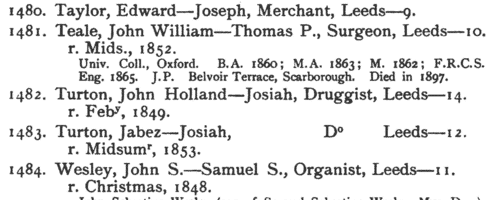Our indexes include entries for the spelling dixon. In the period you have requested, we have the following 2,865 records (displaying 1,201 to 1,210):
Insolvents
(1829)
Declarations of insolvency in England and Wales | Sample scan, click to enlarge

|
Irish Bankrupts
(1829)
Bankruptcy notices for Ireland: bankruptcy often caused people to restart their lives elsewhere, so these are an important source for lost links | Sample scan, click to enlarge

|
Irish Insolvents
(1829)
Insolvency notices for Ireland: insolvency often caused people to restart their lives elsewhere, so these are an important source for lost links, especially for emigrants | Sample scan, click to enlarge

|
Scottish Bankrupts
(1829)
Scotch Sequestrations: bankruptcy often caused people to restart their lives elsewhere, so these are an important source for lost links
| Sample scan, click to enlarge

|
Agriculturists and horticulturists
(1830)
J. Baxter of Lewes, proprietor of the Sussex Agricultural Press, published a compendium called 'The Library of Agricultural and Horticultural Knowledge; with an Appendix on Suspended Animation, Poisons, and the Principal Laws relating to Farming and Rural Affairs'. This was supported by a large subscription of interested gentlemen, farmers and gardeners, whose names and addresses are indexed here. There is a separate list for gardeners, nurserymen and florists, but that and the main list overlap, so both are incorporated here. | Sample scan, click to enlarge

|
Boys entering Leeds Grammar School
(1830)
The admission books for Leeds Grammar School from 1820 to 1900 were edited by Edmund Wilson and published in 1906. The series of registers is almost complete for the period, there being in addition admission registers for the Lower (or Commercial) Department from 1856 to 1865, and lists of boys in the school in 1856, and in the Commercial Department in 1861. The entries are arranged by date or term of admission: a sequential number is given first, then surname, christian name, and, after a dash, father's christian name, occupation, and address; another dash, and then the age of the boy at admission, and often his year of leaving (with the abbreviation r. for 'removed' or 'left'). r.* means left without notice; (o) or S. or Stranger or Foreigner indicates a boy not on the foundation. The editor was unable to divine the meaning of the abbreviation (Q) or the asterisks prefixed to most entries in 1856 to 1860, but dutifully copies them into the text. In smaller type he then proceeds, where possible, to add some information about the boy's subsequent career. | Sample scan, click to enlarge

|
Deaths, Marriages, News and Promotions
(1830)
Death notices and obituaries, marriage and birth notices, civil and military promotions, clerical preferments and domestic occurrences, as reported in the Gentleman's Magazine. Mostly from England and Wales, but items from Ireland, Scotland and abroad.
| Sample scan, click to enlarge

|
Deaths, Marriages, News and Promotions
(1830)
Death notices and obituaries, marriage and birth notices, civil and military promotions, clerical preferments and domestic occurrences, as reported in the Gentleman's Magazine. Mostly from England and Wales, but items from Ireland, Scotland and abroad.
| Sample scan, click to enlarge

|
Inhabitants of Cornwall
(1830)
Pigot & Co.'s National Commercial Directory lists traders, farmers and private residents in the county. | Sample scan, click to enlarge

|
Inhabitants of Devon
(1830)
Pigot & Co.'s National Commercial Directory lists traders, farmers and private residents in the county. | Sample scan, click to enlarge

|
Research your ancestry, family history, genealogy and one-name study by direct access to original records and archives indexed by surname.











